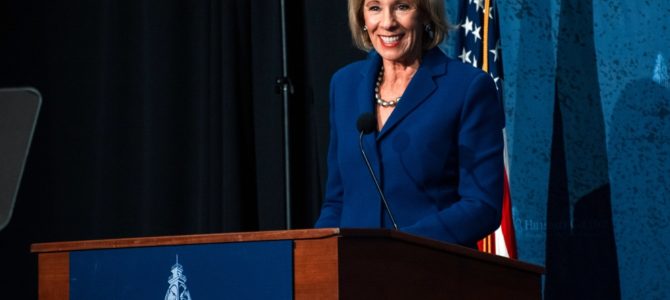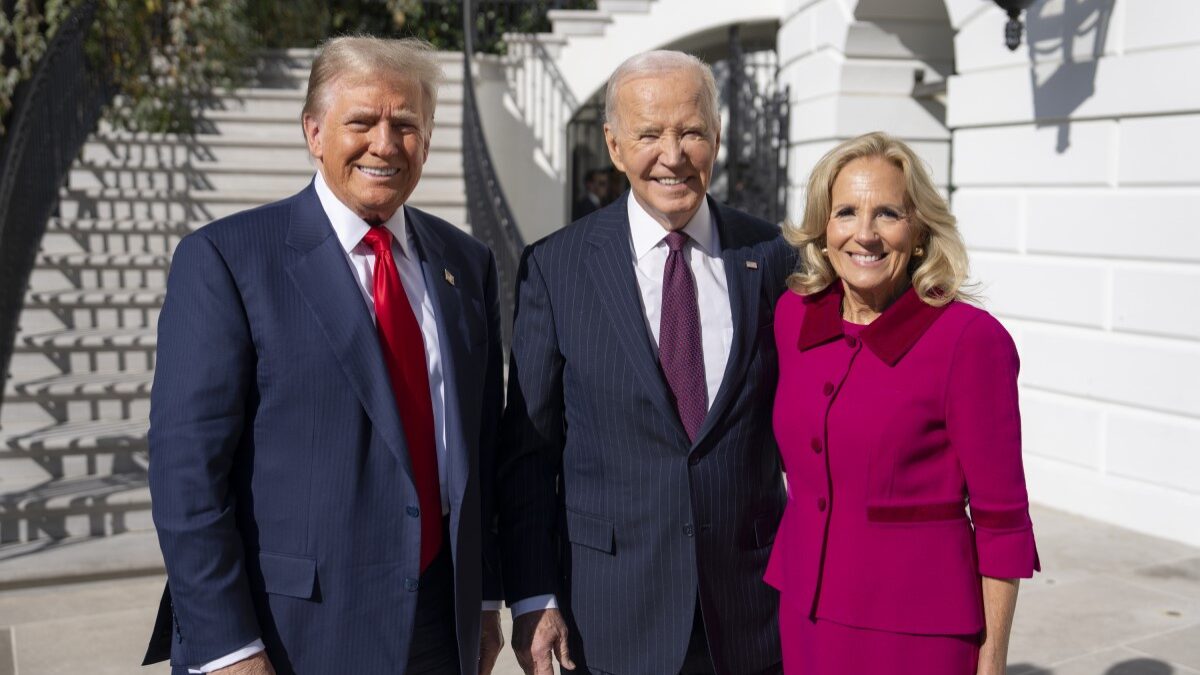
As most of the nation is transfixed on the looming presidential election, Sec. of Education Betsy DeVos remains laser-focused on the job at hand. “Education is the means by which we secure the God-given blessings of liberty,” DeVos told a gathering of more than 250 at Hillsdale College, in her home state of Michigan. Whether she has three months at her post, or the possibility of another four years, will be determined in the coming weeks. Regardless of the outcome on Nov. 3, however, DeVos has made it clear that while she’s happy with what the administration has accomplished, there is still work to be done in the fight to restore America to its founding principles.
“The COVID crisis has laid bare a lot about American education,” DeVos said. “Parents are more aware than ever before how and what their children are — or are not — learning. And far too many of them are stuck with no choices, no help, and no way forward.”
DeVos vowed to fight for America’s students and their parents, and to fight against anyone who would seek to have government usurp the role of the parent.
The solution to much of the current problems facing America, argued DeVos, is to embrace the family as the sovereign sphere that it is, remembering that the family predates government altogether. “The family is not only an institution,” DeVos said, “it’s also the foundation for all other institutions. The nuclear family cultivates art, athletics, business, education, faith, music, film — in a word, culture. And just as the family shapes its culture, it also shapes its government.”
After making it clear schools exist to supplement families and not to replace them, DeVos laid out her vision for the next major initiative she’d like to champion: an expanding and robust school choice program across the nation. “I like to picture kids with their backpacks representing funding for their education following them wherever they go to learn,” DeVos outlined.
The main thrust of the program would be parents having control over how their tax dollars are spent on the education of their children. Ideally, education spending should follow their children wherever they want to learn — a position most Americans now agree with. Indeed, a recent RealClearOpinion survey found 3 out of 4 families with children in public schools sought full school choice, including 73 percent of black families and 71 percent of Hispanic families.
DeVos is bolstered by the rising public support for school choice, education freedom scholarships, and vouchers, but still yearns to further “devolving” of the Department of Education, believing that states and localities can best determine how to address the educational needs of their communities. “When I took on this role, I said from day one that I’d like to work myself out of a job. That I’d work to empower parents, not politicians.”
In the meantime, DeVos recalled the good that has been done during the last four years:
We restored state, local, and family control of education by faithfully implementing the Every Student Succeeds Act, by ending Common Core, and by urging Congress to put an end to education earmarks by consolidating nearly all Federal K-12 programs into one block grant. … We expanded the in-demand D.C. voucher program by 50 percent … supported the creation of more public charter schools … [and] reformed the tax code so families can use tax-preferred 529 savings accounts for expenses related to K-12 education.
DeVos reiterated her support for the bipartisan School Choice Now Act put forth by Sen. Tim Scott, R-S.C., that would directly fund families and empower them to choose the best educational setting for their children. For DeVos, Scott’s inspiring story “demonstrates how education can change lives.”
The secretary explained how scholarships could be used to enhance distance learning, pay for costs tied to educating children at home, or help cover tutoring, technical education, or transportation to a different school. “Scholarships could support students attending the school that best meets their needs or matches their values. At the end of the day, we want parents to have the freedom, the choices, and the funds to make the best decisions for their children,” DeVos explained, adding, “The ‘Washington knows best’ crowd really loses their minds over that.”
In her speech, DeVos conveyed the value of English language arts, math, or science in education. A large and purposeful focus, however, was devoted to how schools teach history. Rekindling the spirit of 1776 and 1787 is, in many ways, the key battleground in the effort to have a citizenry able to defend liberty and stand up against encroaching tyranny.
“It’s ignorant to hate capitalism when you don’t really know how communism hasn’t worked. It’s ignorant to hate freedom when you don’t really know how tyranny hasn’t worked,” DeVos said. “The unholy mob thinks our economies need redistributing. It thinks our Constitution needs rewriting. It thinks our families need restructuring.” As DeVos would later remind the audience, these dangerous beliefs aren’t entirely new, but taken “right from the old Marxist playbook.”
When questioned by The Federalist for an update on President Trump’s 1776 Commission to promote patriotic education and counter the revisionist history of the dangerous and ahistorical 1619 Project, DeVos assured that work on the Commission continues. “We’re working through putting the ‘meat’ on that. Stay tuned.”
Instead of giving in to the temptation to rewrite American history or to cancel culture, DeVos charged those in attendance to challenge the culture with education. “Instead of rewriting our Constitution, let’s return to its timeless words, and restore the power of “We the People,” Devos said. “We don’t believe in retreat. We believe in redemption.”
The great work still to be done in reforming and restoring a healthy, vibrant, and educated American populace, begins, as DeVos argues, by reasserting a fundamental truth: the family is the “first school.”
“If we recognize that, then we must also reorder everything about education around what the family wants and what the family needs. Make no mistake: America cannot win the future if we lose the rising generation,” she said.









